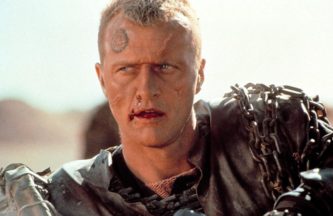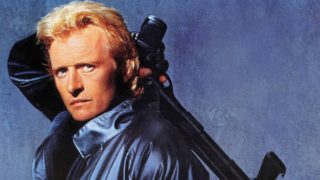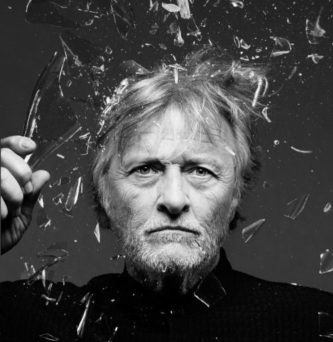The Rutger Hauer saga was a curious one. A Dutch actor who made a minor splash in Hollywood but did the vast majority of his acting in grade-z fare, Hauer proved himself a highly commanding yet also quite mysterious screen presence in an astonishing variety of roles—he was, in short, a true original. It’s no wonder Hollywood never quite knew what to do with him.
Getting a handle on what drove Hauer, outside the obvious—his impoverished childhood in Amsterdam, his early tenure in a travelling theater troupe—is no easy task, and now that he’s gone I doubt we’ll ever get a conclusive explanation. His 2007 memoir ALL THOSE MOMENTS, co-written with Patrick Quinlan, offers few clues, being a brief surface-level account that goes out of its way to paint its author/subject as a nice guy. Much of the book was focused on BLADE RUNNER, a Hauer improvised line from which provided the title, and also the epitaph used in countless online obituaries (the line in question, for the two or three of you who don’t know, was “All those moments will be lost in time, like tears in rain”).
Roy Batty the dangerous yet extremely erudite replicant was a highlight of BLADE RUNNER, and the role would have been a lot less had it not been played by Rutger Hauer. The same can be said for the sexed-up young Dutchman Hauer essayed, in his breakthrough performance, in the Paul Verhoeven directed TURKISH DELIGHT (1973). The menacing intensity that distinguished so many of Hauer’s later performances was on full display in Verhoeven’s film, in addition to a sexual boldness that wasn’t especially prevalent in his later performances.
Verhoeven went on to cast Hauer in several more films. They include the WWII drama SOLDIER OF ORANGE (1977), in which Hauer proved he could pull off a heroic leading man role as well as just about anyone, and FLESH + BLOOD (1985), on which Hauer and Verhoeven had a “terrible fight” that ensured the two would never work together again (a shame, as Hauer’s presence could have done wonders for Verhoeven efforts like TOTAL RECALL, BASIC INSTINCT and HOLLOW MAN). I understand they eventually reconciled, although the bad feelings, it seems, never entirely went away; in a 1990s interview Verhoeven admitted to having a dream in which he held Hauer’s head under the water until he drowned.
This of course brings up a most unfortunate factor of Hauer’s career: he was by all acounts a giant pain in the ass. Actor Jeroen Krabbe, who co-starred in SOLDIER OF ORANGE, has complained about Hauer’s behavior on that film, and Hauer is said to have been largely responsible for transforming Roger Avery’s MR. STITCH (1995) from what I understand was a promising script into the hopelessly bland teleplay that resulted. Then there was THE HITCHER (1986), in which Hauer played a desert-dwelling serial killer engaged in a cat-and-mouse psychodrama with C. Thomas Howell, a role made all the more effective due to the fact that Howell was apparently terrified of his co-star both onscreen and off.
Other great Rutger Hauer roles include the lead in the short lived but potent Paul Verhoeven helmed TV series FLORIS (1969), in which Hauer’s romantic leading man nature was first unveiled; NIGHTHAWKS (1981), which marked one of the first of Hauer’s innumerable English language bad guy roles; EUREKA (1983), in which he fit disconcertingly well into one of the late Nicolas Roeg’s nuttiest-ever movies; LADYHAWKE (1985), in which he played a panther-man who got to romance a young Michelle Pfeiffer (must’ve been a difficult shoot!); BLIND FURY (1989), in which Hauer played the lead role in a black humored updating of the ZATOICHI blind swordsman series; and HOBO WITH A SHOTGUN (2011), which contained Hauer’s last really good role in the best of the retro-grindhouse pics to appear in the wake of the Tarantino/Rodriguez GRINDHOUSE.
One thing most of those roles have in common is the nature of the films they grace. FLORIS and LADYHAWKE aside, the abovementioned films tend toward the exploitative end of the cinematic spectrum, something that characterized the vast majority of Hauer’s 173 film credits. To be sure, he attempted to branch out via appearances in quality fare like Sam Peckinpah’s final film THE OSTERMAN WEEKEND (1983) and Ermanno Olmi’s acclaimed arthouse drama THE LEGEND OF THE HOLY DRINKER (1988), but more typical were programmers like OMEGA DOOM, TURBULENCE 3: HEAVY METAL (who knew there was a TURBULENCE 2?) and 24 HOURS TO LIVE.
One has to wonder, given such a vast quantity of appearances in disreputable fare, if that was entirely due to financial necessity. The fact that Hauer chose to spend much of the late 1980s, his “hot” period, in the likes of WANTED: DEAD OR ALIVE (1986) and THE BLOOD OF HEROES (1989) suggests that he had an affinity for the trashy quite early on in his career, and that affinity never entirely dimmed (I have the same belief about David Carradine). An interesting article, I feel, can be written about Hauer’s trash movie career—as opposed to most of the obituaries that have appeared thus far, which tend to focus largely on BLADE RUNNER and LADYHAWKE—which may well turn out to constitute his true cinematic legacy, a statement I can’t help but suspect that the famously prickly and complex Rutger Hauer would at least partially approve.




